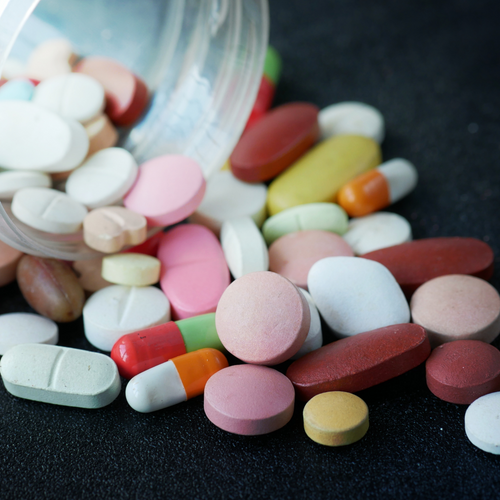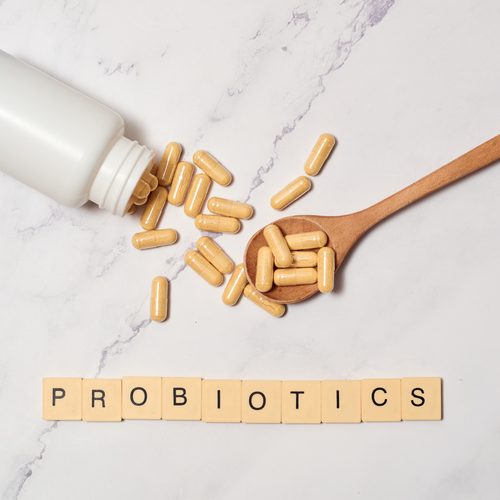The effect of sugar on the stomach
The gut microbiota, or the community of microorganisms that reside in our digestive tract, plays a vital role in digestion, immunity, and even regulating our mood. Several studies have shown that excessive sugar consumption can disrupt this delicate ecosystem. Indeed, high-sugar diets can promote the growth of pathogenic gut bacteria, while reducing the diversity of beneficial species. This imbalance can lead to chronic inflammation, which is associated with many diseases, including inflammatory bowel disease (IBD) and irritable bowel syndrome (IBS) [1].
The effect of sugar on the skin
The skin microbiota, the community of microorganisms living on the surface of our skin, plays a key role. Unfortunately, the effect of sugar on the skin can be twofold: on the one hand, excessive sugar consumption can contribute to skin problems such as acne and eczema. On the other hand, sugars can also directly affect the skin microbiota.
In fact, one study found that diets high in sugar can promote the growth of skin bacteria associated with skin inflammation, which can worsen existing skin problems [2]. Additionally, high blood sugar, which is the result of excessive sugar consumption, can also contribute to increased sebum production, which can clog pores and promote acne [3]. But sugar doesn't stop there. It also has osmotic properties, meaning it has the ability to draw water out of skin cells. This action can contribute to skin dehydration, leading to moisture loss and dryness. The result is duller skin and more pronounced wrinkles, while often times, we try to mask these signs with creams. But the first step to having glowing skin on the outside starts with taking care of yourself from the inside out.
Possible Solutions
To maintain a healthy gut and skin microbiota, it is important to reduce your intake of added sugars. It is recommended to limit your sugar intake to less than 10% of your total calorie intake [4]. This can be achieved by avoiding sugary drinks (sodas, fruit juices, smoothies), candy, processed cakes, and ultra-processed foods, and by favoring a diet rich in fiber, vegetables, and fresh fruits.
What if there was a real alternative to sugar?
What if we told you that you don't have to give up sweet taste to take care of your microbiota and your health? That's what Yacon&Co's Yacon syrup promises! It's a healthier alternative to sugar that's gaining popularity due to its unique properties. It's extracted from the roots of the Yacon plant, a plant native to South America. This syrup is naturally sweet with a very low glycemic index, meaning it doesn't cause rapid spikes in blood sugar that usually lead to weight gain. In addition, Yacon syrup is rich in prebiotic fiber that can promote the growth of beneficial bacteria in the gut microbiota. This syrup can be used in drinks, sauces, dressings, and desserts, offering a very interesting alternative to refined sugar while maintaining that sweet and pleasant touch that we love so much. So what are you waiting for? Discover it right here !
References:
- Wu, H., Esteve, E., Tremaroli, V., Khan, MT, Caesar, R., Mannerås-Holm, L., ... & Bäckhed, F. (2017). Metformin alters the gut microbiome of individuals with treatment-naive type 2 diabetes, contributing to the therapeutic effects of the drug. Nature Medicine , 23(7), 850-858.
- Juge, R., Rouaud-Tinguely, P., & Breugnot, J. (2017). Sugary food regulates the composition of cutaneous microbiota. The Journal of Investigative Dermatology , 137(5), S64.
- Melnik, B.C. (2012). Diet in acne: further evidence for the role of nutrient signaling in acne pathogenesis. Acta Dermato-Venereologica , 92(3), 228-231.
- World Health Organization (WHO). (2015). Sugars intake for adults and children: Guideline. World Health Organization.
- Marchesi, JR, Adams, DH, Fava, F., Hermes, GDA, Hirschfield, GM, Hold, G., ... & Winstanley, C. (2016). The gut microbiota and host health: a new clinical frontier. Gut , 65(2), 330-339.















